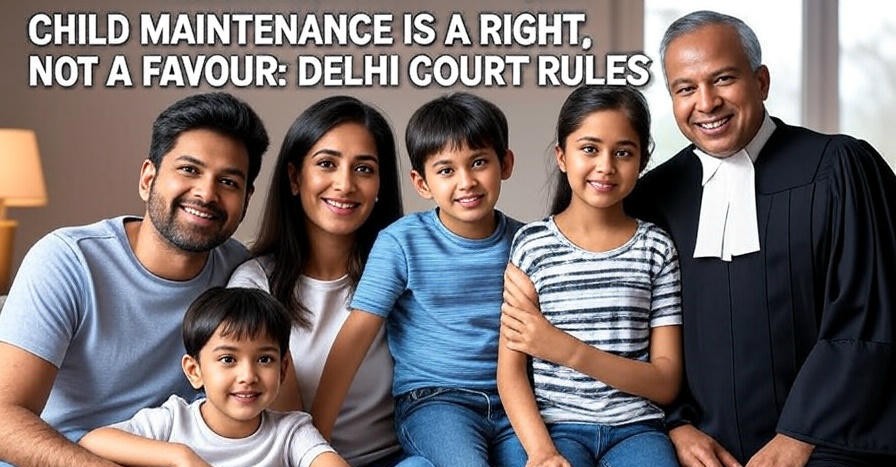INTRODUCTION
The Delhi High Court decided that child support is a legal obligation rather than a charitable donation. Both parents are responsible for making sure the child lives in safety and dignity. The Delhi High Court has stated unequivocally that providing maintenance is not a favor that one parent does for the other. It is a legal obligation that results from both the child’s right to care and from being a parent.
The legal aspects of child support will be examined in this article, along with the ratio of this ruling.
CASE JUDGEMENT
Justice Swarana Kanta Sharma made some significant comments regarding maintenance during the hearing of a case involving a father who refused to provide maintenance for his two young children.
“Maintenance is a recognition of shared parental responsibility and the child’s right to be supported, not a favor,” she stated.
The case concerned a man who appealed a local trial court’s decision to require him to provide his wife, who resides with their two young children, with Rs 50,000 per month in interim support. The father argued that this sum was excessive and that the wife should pay half of the costs associated with the children because she works.
The High Court, however, upheld the lower court’s ruling and denied the father’s appeal. According to the judge, paying maintenance shouldn’t be interpreted as punishment or charity.
“Maintenance is not intended as a form of punishment or to diminish the non-custodial parent. In the same vein, the custodial parent shouldn’t be seen as someone in need of alms or charity.
The Court emphasized that living with only one parent should not make youngsters feel as though they are missing out on anything. “A child living with a single parent should not feel deprived, either materially or emotionally,” said Justice Sharma.
With the financial stability that may have resulted from the father’s assistance, maintenance must guarantee that the child can live with the same dignity as he would have if he had been living with both parents.
It was discovered during the case that the father had attempted to conceal his true income. The Court saw his failure to provide accurate documentation about his supermarket company as an attempt to understate his actual income. The father’s monthly salary was estimated by the trial court to be approximately Rs 1.75 lakh. On the basis of this, the Court determined that Rs 50,000 a month was a reasonable sum for the upbringing and care of the two young children.
The Delhi High Court’s decision, which emphasizes that maintenance is a fundamental obligation and not a voluntary gesture of kindness, sets a significant precedent.
Additionally, it emphasizes the child’s rights and both parents’ obligations, particularly when one parent attempts to avoid their financial obligations.
INDIAN LEGAL PROVISIONS ON CHILD MAINTENANCE
Following a separation or divorce, parents are legally required to provide for their children financially through child maintenance, also referred to as child support. Ensuring the child’s welfare and maintaining a standard of life comparable to what they would have had if both parents were together is a shared obligation rather than a luxury or charity.
In India, Section 125 of the Code of Criminal Procedure (CrPC) and Section 20 of the Hindu Adoptions and support Act, 1956 (HAM Act) are the major laws governing child support. These rules guarantee that children’s basic requirements are satisfied by providing for their financial support, irrespective of the parents’ marital status.
CrPC
According to CrPC Section 125, a parent who has enough money is required to help their minor children—legitimate and illegitimate—who are unable to maintain themselves. It also covers major children with physical or mental disabilities who are unable to support themselves, with the exception of married daughters.
HAM
Section 20 of the HAM Act requires both the mother and the father to provide for both illegitimate and legal children while they are minors. It also includes the upkeep that children provide for elderly or disabled parents.
COMPONENTS OF CHILD MAINTENANCE
Who Pays: Generally, maintenance must be paid to the parent who provides the child’s primary care (the parent with care) by the non-resident parent.
The child’s needs, the income and financial resources of both parents, and other pertinent variables are taken into consideration while determining the amount of maintenance.
The duration of maintenance payments is typically 18 years old in most jurisdictions, however they may go longer if the kid is still enrolled in school or has other special requirements.
Enforcement: The court may take steps to enforce the maintenance order, such as wage garnishment or other actions, if a parent neglects to pay.
Private Agreements: If parents are unable to agree, a court may issue a formal maintenance order. However, parents may also enter into private agreements.
CONCLUSION
Child maintenance is essential for a child’s growth and well-being because it covers the cost of their necessities, such as clothing, food, housing, and medical treatment. It also recognizes that, regardless of their relationship status, both parents have a legal obligation to provide for their child’s financial needs.
ABOUT THE AUTHOR

SAHIL YADAV, a law student at NLIU Bhopal, is a dedicated and passionate legal writer, who is keen to explore International law, Constitutional Law, Criminal Law, Forensic Psychology and publish research papers and articles on contemporary legal nuances and issues. He is also interested in the intersection of disciplines like history, psychology, political science, philosophy, and sociology with law.

